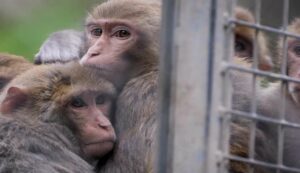USDA confirms it is investigating monkey deaths at Alpha Genesis primate research center
United States: The Animal and Plant Health Inspection Service (APHIS) of the U.S. Department of Agriculture (USDA) has verified that it is looking into allegations that around eighteen monkeys at the Alpha Genesis Primate Research Center in South Carolina perished.

The long-tailed macaque, which is endangered, died last week due to an alleged heater malfunction at Alpha Genesis, a company that breeds primates frequently used for biomedical research, according to the complaint, which was filed Monday by the animal rights advocacy group People for the Ethical Treatment of Animals (PETA).
Dr. Lisa Jones-Engel, a PETA prime scientist, gave “multiple whistleblower reports” to support the allegations of a potential diesel heater breakdown.
The APHIS did not verify the purported whistleblower disclosures, but it did tell many media outlets that it had received a complaint from PETA over these claims.
“APHIS takes enforcement of the Animal Welfare Act seriously,” a spokesman stated in a statement. We are aware of this circumstance and are responding in accordance with accepted procedures. We’ll publish any inspection reports that come up on our public search engine. All Animal Welfare Act licensees’ inspection and enforcement history are available via our public search tool. 56-B-0120 is Alpha Genesis’ certificate number.
Here’s all I can provide right now. I can attest to the fact that we just received a complaint with specific charges, and we are now examining them to see whether there are any Animal Welfare Act (AWA) violations that need further investigation.
When 43 Rhesus macaque monkeys escaped from the Yemassee facility earlier this month due to an employee’s failure to completely lock a door during normal feeding and health checks, Alpha Genesis made headlines. Four of the monkeys were missing two weeks following the event.
Alpha Genesis CEO Greg Westergaard said at the time that the discovered monkeys had “no ill effects from their outdoor adventure.”
Because they are among the most genetically similar animals to humans, rhesus macaques and long-tailed macaques have long been employed by scientists and medical professionals.
In the middle of the 20th century, they contributed significantly to the creation of the polio vaccines.
A 2017 article published in the official journal of the Institute for Laboratory Animal Research stated: “Nonhuman primates (NHPs), and monkeys in particular, are important preclinical models for understanding the etiology of human diseases and for developing therapies and vaccines to cure or eliminate disease.”
After 26 primates fled in 2014 and another 19 in 2016, the U.S. Department of Agriculture penalized the institution $12,600 in 2018.